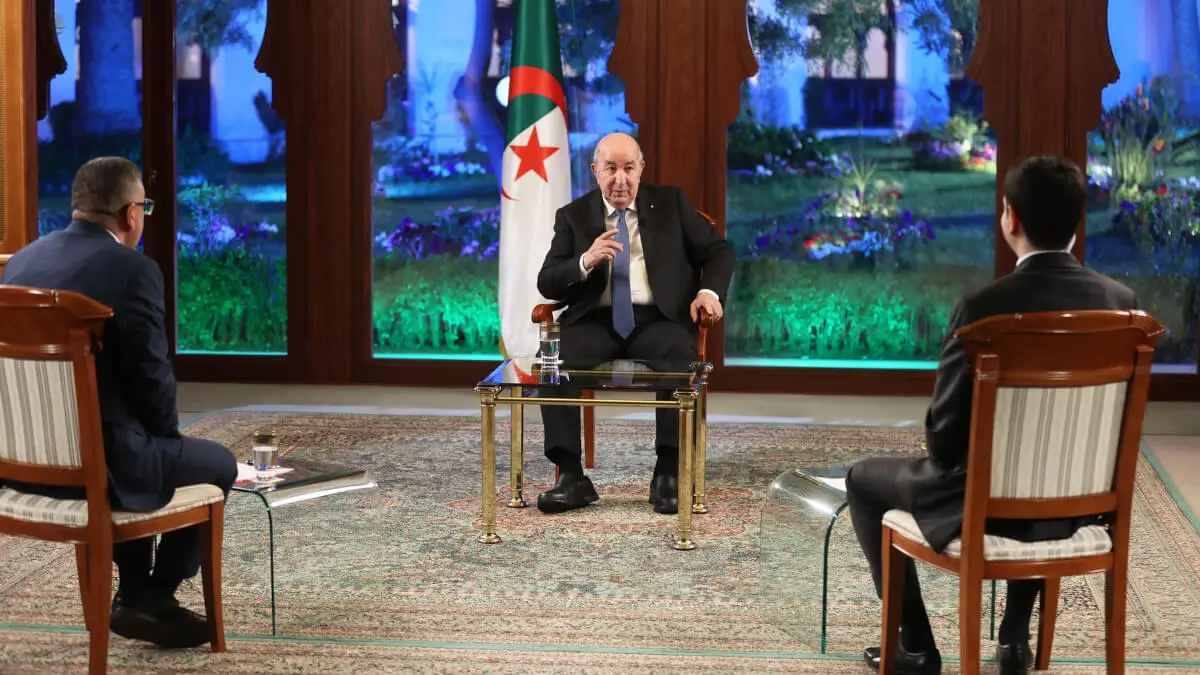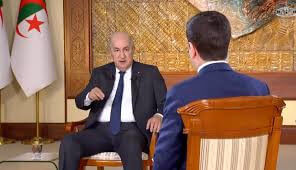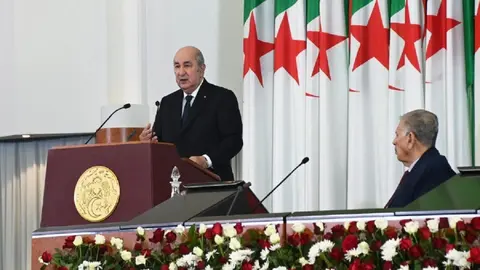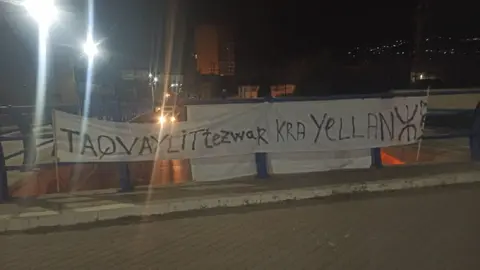Tebboune's television flop

Algerian President Abdelmadjid Tebboune's meeting with two journalists from the government press, broadcast on the evening of 30 March, was a complete flop. It was a fiasco all round, given the man's total lack of mastery of the subjects discussed. He went so far as to give extravagant figures and promise unachievable projects, some of which are utopian.
- The anticipated presidential election
- Tebboune sees himself as President after 07 September
- Tebboune's blunders
The anticipated presidential election
President Tebboune was expected to address the issue of the early presidential election announced on Thursday 21 March following a meeting of a number of personalities who had no constitutional authority to take such a decision. However, the question had been prepared before the recording. A recording reviewed and corrected twenty-four hours before it was broadcast.
A question as important as the presidential election, the most important event of the year, was treated casually by the Algerian president, who reduced the reason for the decision to bring forward the election, which means, in particular, shortening his term of office, to "purely technical reasons without any impact on the election". He justified these technical reasons by saying that "December is not election month in Algeria". For him, all the rest is speculation. In short, we have to understand that this is a banal decision for a banal event that deserves no attention or explanation. Yet it is a political act of the utmost importance that the Algerian authorities, led by President Tebboune, wish to relegate to the back burner of popular concerns.
What is even more surprising is that the President was very angry with all those who tried to understand and find out the reasons behind the decision to bring forward the presidential election. One of the two journalists interviewing him reached out to him and described those who analysed and commented on the decision as enemies of Algeria. Tebboune jumped at the chance to curse them and "pray to God to strike them down with disease". Unheard of!

Tebboune sees himself as President after 07 September
Asked indirectly whether he intends to run for a second term, Abdelmadjid Tebboune said that "now is not the right time to make up his mind". And he did not fail to contradict himself throughout the meeting with extrapolations that would have us believe that the 07 September election is, in reality, a mere formality to be fulfilled. For example, he promised salary increases of 57% in 2026, following on from the 43% increases made at the start of his mandate in 2020, as if to say that there was continuity in his actions at the head of the State. He backed up this continuity by promising to increase overall GDP to 400 billion dollars by 2026. And, as the icing on the cake, he considers that his state visit to Paris, scheduled for late September and early October, is "still on the cards". "It's a historic visit that shouldn't be missed", he said.
If we understand correctly, Abdelmadjid Tebboune sees himself re-elected for a second term, and the results of next September's presidential election are known in advance. "This is a real insult to the Algerian people and an unambiguous announcement of large-scale fraud", commented one political opponent. Tebboune tends to forget that the 2019 election, which opened the doors of the El-Mouradia presidential palace to him, was boycotted by the people to the extent that two departments, Tizi-Ouzou and Bejaïa, recorded a zero turnout. Not a single voter turned out in either department. Even the officials (prefect, head of the military sector, head of departmental security, commander of the national gendarmerie group and all their staff) did not go to the polling stations under pressure from the demonstrators, who closed all the polling stations.
In any case, fraud is on the cards for the September presidential election, whoever is in power. You don't have to be a rocket scientist to work it out. Only one date has been set for the ballot: 7 September. This means that there will be only one round. And yet, in democratic countries, for a pluralist election, there must always be a second round.
Tebboune's blunders
If Tebboune's answers to the not at all embarrassing questions posed by two journalists whose job was much more to serve the soup, as they say in journalistic jargon, were of no use to observers of the Algerian political scene, his televised appearance was marked by monumental blunders, the secrets of which he alone holds.
These blunders, which are forbidden to be commented on in the Algerian media, provoked unprecedented hilarity on social networks. The most comical is undoubtedly that relating to the exchange rate of the Algerian currency on the financial market. For Tebboune, "the Algerian dinar is currently trading at 140 US dollars. It needs to be brought down to 100 US dollars to facilitate imports". A blunder that will not be the first or last of the evening.
The promise to increase GDP to more than 400 billion dollars by 2026 can be put down to the extravagance of the Algerian Head of State, who likes to inflate figures to say without any hesitation that "by 2026 Algeria will be an emerging country and no longer a developing country". Is Tebboune unaware that this emerging country has been economically paralysed since its inauguration? Is he unaware that Algeria does not have a single economic project capable of curbing, at least in part, the endemic unemployment that is closing all the horizons of a youth whose only way out is illegal emigration? During this press conference, the Algerian President promised to solve the problem of illegal emigration within the next two months. "In two months' time, we will no longer be talking about this issue. All illegal Algerians abroad will be regularised", he said confidently. How will this regularisation take place? The two journalists didn't dare ask the question, and Tebboune didn't see fit to explain. Another blunder.
Will the emerging country that Tebboune is promising by 2026 be able to meet the population's milk needs? The Algerian President's answer will be the highlight of this anthology of blunders. "We are about to sign a contract to build a 100,000 hectare farm in Adrar (1,306 km south of Algiers) to produce milk powder". It's enough to make you fall head over heels when you hear such an announcement. Social networking sites were abuzz with laughter.
First of all, the Algerian President did not say that this farm would be used for cattle rearing. He said "we're going to produce our own milk powder". Secondly, even if he is implying cattle farming, it should be explained to him that 100,000 hectares is the size of the States of Bahrain and Malta combined. To make them profitable, you would need 70 cows per hectare. In total, we would need 7 million cows. Where will these 7 million dairy cows come from? And how will we support them in the middle of the desert? Is there enough water in Adrar for all these cattle?
Where will they get the 392,000 tonnes of cattle feed they need every day? An expert in the field asked: "Assuming that the Office Algérien Interprofessionnel des Céréales (OAIC) manages to satisfy these needs every day, it would take 95,000 semi-trailer trucks a day to deliver to the Adrar farm. And that's not counting water, pasture, fodder, veterinary pharmaceuticals and, above all, labour and accommodation. At a rate of one employee per 200 cows to be managed (feeding, care, floor cleaning, etc.), 35,000 employees would be needed, almost as many as at the SONATRACH oil company.
Tebboun's blunder is reminiscent of another he made in September 2023 before heads of state and delegations from all over the world at the 78th UN General Assembly, when he spoke of the desalination of sea water. He announced that Algeria would be able to "desalinate 1.3 billion m3 of water per day by the end of 2024". Quite simply, this means drying up the Mediterranean in a matter of months.
Listening to the Algerian president multiply his blunders and misunderstandings of this kind, it's enough to make you wonder "are there any advisers at the El-Mouradia palace? It's an open question.











